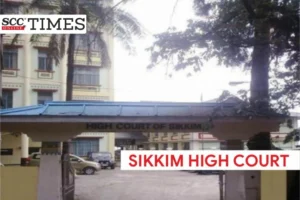Sikkim High Court: In an appeal made under Section 173 of the Motor Vehicles Act, 1988, filed by the appellants aggrieved by the judgment of the Motor Accident Claims Tribunal, Sikkim (“MACT”/ “Tribunal”), the Single-judge Bench of Meenakshi Madan Rai, J.* distinguished from the case relied upon by the Tribunal and set aside its judgment. The Court discussed at length the difference between a gratuitous passenger travelling in a private vehicle that met with an accident, and the deceased wife of the insured in the instant case who was held to be covered as a “third party”. The distinction was elemental as the Tribunal relied on a case wherein the insurer was found to be non-liable towards a gratuitous passenger’s demise. To compute the amount of compensation, the Court relied on the formulae devised from various judgments and applied the concept of “just compensation” and awarded compensation of Rs 27,65,000 to the appellants.
Background
In 2019, the deceased was travelling with her husband in their private car owned and insured by the husband with the respondent, which veered off the road and fell into a river in South Sikkim, claiming the life of the couple. The appellants (mother-in-law and minor son of the deceased mother) sought compensation of Rs. 37,10,000 (thirty-seven lakhs and ten thousand), through a claim before the MACT.
The respondent resisted the claim, stating that the vehicle was driven in contravention of the insurance policy, therefore exempting them from any liability. The insurance policy submitted by the respondent stated that it covered only the personal accident of the owner/driver amounting to Rs. 15,00,00 (fifteen lakhs).
The appellants were denied compensation by the MACT, by relying on the case of New India Assurance Co. Ltd. v. Geeta Khatiwada, 2021 SCC OnLine Sikk 196. Aggrieved by the Tribunal’s judgment1, the claimants appealed before the Court.
Issue
Whether the appellants were entitled to compensation on account of death of the wife who was travelling in the private vehicle of her husband, which met with an accident leading to the death of both the husband and wife?
Court’s analysis and judgment
The Court highlighted that an insurance policy emanates from a contract of indemnity between the insurer (first party) and the insured (second party), against the liability incurred by the insured. Referring to Section 147 of Motor Vehicles Act, 1988 (“MVA”), the Court elucidated that a third party would be a person who was not a party to the insurance policy and could be a person on the road, an occupant of another vehicle, or an occupant of the insured vehicle under such policy.
The Court considered that the deceased passenger as the wife of the insured driver, was a third party in the insurance arrangement. The respondent reflected through their submissions that the covered amount for the liability of the insured accruing towards a third party in the event of an accident of the vehicle was limited to Rs. 7,50,000 (seven lakhs fifty thousand). The Court found this limitation to be erroneous interpretation of the Limits of Liability of the respondent, as the provision in essence referred to any damage to the property of a third party, and not their death.
The Court also found the reliance of the MACT in Geeta Khatiwada (supra) to dismiss the claim petition was misplaced, as in that case the deceased persons were travelling gratuitously in a private vehicle whereas in the instant case the deceased was the wife of the driver/owner, qualifying as a third-party and cannot be a gratuitous passenger.
The Court discussed the concept of “just compensation” as explained by the Supreme Court in National Insurance Company Limited v. Pranay Sethi, (2017) 16 SCC 680, wherein, it was noted that “just compensation” must be viewed through the prism of fairness, reasonableness and non-violation of the principle of equitability. The Supreme Court had stated that, “In a case of death, the legal heirs of the claimants cannot expect a windfall (…) The determination must be on the foundation of evidence brought on record as regards the age and income of the deceased and thereafter a requisite multiplier should be applied”.
The Court also referred to Pappu Deo Yadav v. Naresh Kumar, (2022) 13 SCC 790, wherein “just compensation” was computed by including all elements that would go to place the victim in as near a position as they were in, before the occurrence of the accident.
Relying on the computation formulas devised in Pranay Sethi (supra), Sarla Verma v. Delhi Transport Corporation, (2009) 6 SCC 121, and Magma General Insurance Company Limited v. Nanu Ram, (2018) 18 SCC 130, the Court derived at a figure of Rs. 27,65,000 (Twenty-seven lakhs and sixty-five thousand only) to which the appellants were entitled, with simple interest at 9% per annum, on the afore-said amount with effect from the date of filing of the Claim Petition before the MACT, till its full realisation, failing which, the respondent shall pay simple interest @ 12% per annum.
Therefore, the Court set aside the judgment of the MACT, distinguishing the Geeta Khatiwada (supra) judgment and directed that 25% of the payable amount shall be entitled to the surviving mother-in-law, and 75% shall be entitled to the minor son of the deceased.
[Passi Lamu Sherpa v. New India Assurance Co. Ltd. 2024 SCC OnLine Sikk 24, decided on 14-05-2024]
*Judgment by: Justice Meenakshi Madan Rai
Advocates who appeared in this case :
Advocates for the Appellants: Umesh Ranpal and Laxmi Khawas
Advocate for the Respondent: Dipayan Roy
1. Passi Lamu Sherpa v. New India Assurance Co. Ltd., MACT Case No. 7 of 2020

